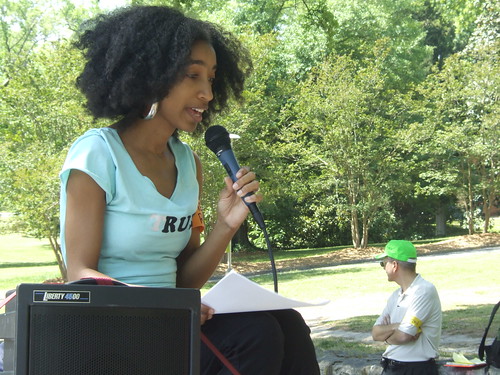A wild augmented reality appears!
As I went up the hill to get groceries today, from across the street I hollered “Well hey there! I see you’re catching a Pokémon!” to a guy in front of the Bernal Heights library. He barely even turned to look at me as I rolled up but he giggled and replied “Yep, lots of Zubats in this neighborhood!” Just a normal conversation between strangers apparently taking a photo of a blank wall of a public building!
I am level 4, I have an egg in the incubator and am all hot to get to the point where I can fight a Pokémon in my local Pokégym. Sorry but you will all have to get used to people talking like this. Welcome to the future.
As I have played Ingress for the past 3 years a bit obsessively I am very happy Niantic has this massive success. And also proud that some of my portals and photos and descriptions are integrated into Pokémon Go. I still prefer the elegance and game balance of Ingress, and the interesting social behaviors and structures that have evolved for it. (I can go to any city, and find Ingress portals and talk to its players; instant social group.) But I can see cool potential and the greater mass appeal of the new game built on the bones of Ingress data & infrastructure.
I know people will hate on this game for many reasons. It’s popular (yet dorky) for one. It will make people mad that others are doing something pointless. Its selfies will infuriate the grumpy people who hate the idea of self-portraits. People will inevitably walk into buses and off of cliffs and cause poké-stop-while-driving accidents. But I love this moment, the huge surge of cultural awareness as the game spreads. By tomorrow, people will start writing mainstream articles explaining the entire phenomenon or discussing why you should or shouldn’t let your kids play the game.
For me it is a beautiful and historic moment as it feels like a level up for mass participation in a virtual or augmented reality. This has plenty of potential for good and bad. It will spark people’s imaginations, even as it drives us further into ubiquitous surveillance of our location data and habits. Part of the cool thing is it creates a shared imaginary world and a geographic overlay to our real world. Combined with the powerful impulse we have to collect things and know trivia it will be a collective and somewhat guilty pleasure of people who have the money and privilege enough to have a lot of data bandwidth on their mobile devices. And who don’t mind handing even more of their data over to “the cloud”.
We can build strong memories and shared experiences that stay with us for years in game play. That will be enhanced by using the geography of the world around us!
Unlike the bohemian and esoteric pleasures of ARG-ing this is a swift popular movement of millions of people joining the game. It’s huge! I expect it to very rapidly become a placeholder or touchstone for people’s fears and dreams about technology. We will see a sort of mythos develop around it like the way you can see nuances and divisions in how people approach the idea of Minecraft. Something that they use as a container for the idea that young people these days, or whoever, aren’t properly politically engaged or doing the correct things or are sheep following pop culture; and/or an activity that is frightening, incomprehensible, t hat makes us vulnerable; and/or a social technology that could unlock something like the collaborative power of flash mobs.
The first attempt to make a game like this I am aware of was called “Pod” (annoyingly hard to Google) in the early/mid 90s. It was a small handheld device, like a tamagotchi gadget, on which you could collect parts to build little insectoid robots. In theory you would come across other Pod players in the real world at random and could trade parts in order to evolve your robo-insect things. I don’t remember how they communicated with each other. I only came across a random stranger to trade Pod pieces with once, in a mall in San Jose, after many months of carrying it around. The Pod was supposed to somehow be educational about the idea of Darwinian evolution! At the time this game was very exciting, but it didn’t pan out.
Anyway, we aren’t yet all walking around wearing dystopian headsets but I expect more AR overlays to come, maybe historical details so you can step through time on the map where you’re walking, maybe layers that are more artistically complex (though ludic complexity is also art!) or overtly political.






